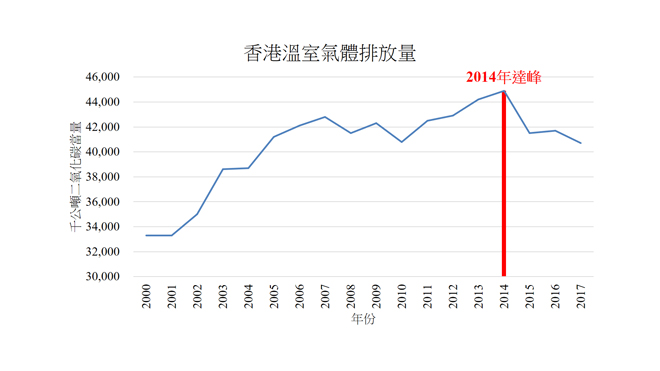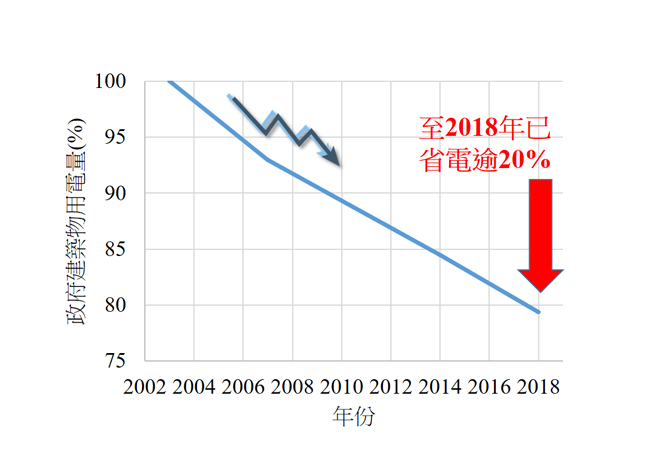Hong Kong making notable progress in carbon reduction to address challenges of climate change
22 December 2019
Today is the Winter Solstice. In Chinese traditions, the Winter Solstice is as important as the Chinese New Year and is a time for people to gather for sumptuous family meals. Have you noticed that while the Winter Solstice used to be a rather chilly day, the winter season has now become quite warm?
As global warming intensifies, extreme weather has become more common, causing food production to decline. In face of such crises, the international community must work in full cooperation. The 25th United Nations Climate Change Conference concluded last Sunday in Madrid, Spain was the longest ever with an additional 40-odd hours of meeting time. Despite more than two weeks of negotiations, the nearly 200 participating countries failed to reach a consensus on the implementation of Article 6 of the Paris Agreement regarding carbon markets, the core issue of the conference. Discussion will have to continue at the next annual conference to be held in the United Kingdom next November.
Despite the lack of major breakthroughs in international negotiations over the implementation details of the Paris Agreement, the SAR Government will spare no effort in combating climate change. We join the international community in tackling the global climate crisis, and together we will work towards meeting the targets laid down in the Paris Agreement step by step.

|
The Paris Agreement requires all countries to reach peaking (i.e. the maximum level) of carbon emissions as soon as possible and undertake rapid reductions thereafter1. In Asia, for example, both China2 and Singapore have set a target to reach peaking by 2030. With the vigorous implementation of various carbon reduction initiatives by the SAR Government, the total volume of carbon emissions in Hong Kong is believed to have peaked in 2014 and started to show a significantly decreasing trend.
Following the adoption of the Paris Agreement in 2015, the SAR Government set up a high-level Steering Committee on Climate Change (SCCC) in 2016 with a view to formulating long-term climate policies. Chaired by the Chief Secretary for Administration, the SCCC strengthened the steering and co-ordination of efforts among various bureaux and departments in combating climate change. With great emphasis on environmental protection and strong determination to build Hong Kong into a green and liveable low-carbon city, the Government announced Hong Kong's Climate Action Plan 2030+ in the following year, outlining its key measures to mitigate, adapt to and combat climate change as well as setting a target to reduce the city's carbon intensity by 65% to 70% by 2030 compared with the 2005 level, which is equivalent to a reduction of 26% to 36% of Hong Kong's total carbon emission, while per capita emission will decrease from 6.2 tonnes in 2014 to 3.3 to 3.8 tonnes in 2030.
Having regard to the fact that electricity generation accounts for around 65% of carbon emissions in Hong Kong, the Government has reached agreements with the two power companies to gradually replace coal-fired electricity generation with gas-fired electricity generation, the latter being cleaner, with a view to meeting the set targets mentioned above. At the same time, the Government continues to promote energy saving and the development of renewable energy through introducing a Feed-in Tariff to encourage the installation of renewable energy systems. So far, the response has been positive, with over 5 000 projects approved in the first year. Besides, the Government will install solar PV panels for eligible schools and welfare non-governmental organisations free of charge, and examine if larger-scale solar generation systems can be installed at suitable locations at reservoirs and landfills. We have also earmarked $2 billion to implement renewable energy projects at various government facilities.

|
In Hong Kong, buildings account for 90% of the city's electricity consumption. Therefore, enhancing energy efficiency in buildings is one of the key areas of our work on carbon reduction. To serve as a model, the Government has taken the lead in implementing energy conservation programmes in government buildings since 2003. As at 2018, electricity consumption was reduced by over 20% through the concerted efforts of various departments.
The 2019 Policy Address has set a more comprehensive and ambitious Green Energy Target which aims to achieve a further reduction of 6% in the Government's total energy consumption from 2020 to 2025 through energy saving and the use of renewable energy. To this end, we will conduct energy and carbon audits for over 200 government buildings to explore opportunities for energy saving and carbon reduction. For owners of private buildings, the Electrical and Mechanical Services Department will continue to promote "retro-commissioning", i.e. inspection of electrical and mechanical facilities in old buildings to optimise their modes of operation for the sake of enhancing energy efficiency. Also, the Government has set up an E&M InnoPortal to promote the use of innovative technology in electrical and mechanical facilities to save energy.
Transport is the second major source of carbon emissions in Hong Kong, accounting for around 18% of the total volume. We will continue to develop rail transport, promote the use of new energy vehicles and ferries, encourage walking and create a "bicycle-friendly" environment to facilitate low-carbon commuting. Besides, the Government will promote the development of green and low-carbon communities to raise public understanding of the significance of climate change and related action such as consumption and waste reduction.
According to the 2017 greenhouse gas inventory for Hong Kong released in July this year, total carbon emission in 2017 amounted to around 40.7 million tonnes while per capita carbon emission reached 5.5 tonnes. Carbon intensity decreased by around 34% over 2005, representing steady progress towards the emissions reduction targets for 2030. Yet, full public participation is necessary to attain the target of cutting per capita carbon emission to 3.3 to 3.8 tonnes by 2030. To formulate a long-term decarbonisation strategy up to 2050, the Council for Sustainable Development conducted a public engagement exercise this year and the views received are being analysed.
Although Hong Kong is a tiny place in comparison with other countries and cities, everyone is obliged to protect the environment. Through the SCCC, I will continue to lead various bureaux and departments in implementing the measures promulgated in Hong Kong's Climate Action Plan 2030+ to combat climate change. I appeal to people from all walks of life to lead a low-carbon lifestyle in clothing, diet, housing and transportation, so as to combat the cross-generational, cross-territorial, cross-sectoral and cross-domain environmental challenge of climate change.
Being a part of the global village, Hong Kong is obliged to take proactive actions to tackle the challenge of climate warming. At this moment, amidst the volatile political climate, Hong Kong is like being threatened by extreme weather. Our government team, working in unison with all civil service colleagues, will maintain poise in the face of adversity. With professionalism and hard work, we are committed to stopping violence and serving the community without fear of challenges and difficulties. While returning peace to society, we will join hands with the public to walk through the dark and find a way out for Hong Kong.
1. Section 1 of Article 4 of the Paris Agreement reads: "In order to achieve the long-term temperature goal set out in Article 2, Parties aim to reach global peaking of greenhouse gas emissions as soon as possible, recognizing that peaking will take longer for developing country Parties, and to undertake rapid reductions thereafter in accordance with best available science, so as to achieve a balance between anthropogenic emissions by sources and removals by sinks of greenhouse gases in the second half of this century, on the basis of equity, and in the context of sustainable development and efforts to eradicate poverty."
2. The country has set an overall target to reach peaking of carbon emissions by around 2030 and encourages capable cities to reach peaking earlier.

